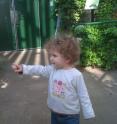Children's early gesture have important link to school preparedness
Children who convey more meanings with gestures at age 14 months have much larger vocabularies at 54 months than children who convey fewer meanings and are accordingly better prepared for school, according to research at the University of Chicago published in the journal Science on Friday, Feb. 13. The research showed that the differences particularly favored children from higher-income families with well-educated parents and may help explain the disadvantages some children from low-income families face upon entering school, said Susan-Goldin Meadow, who co-authored the study with fellow psychologist Meredith Rowe.
"Vocabulary is a key predictor of school success and is a primary reason why children from low-income families enter school at a greater risk of failure than their peers from advantaged families," said Goldin-Meadow, the Beardsley Ruml Distinguished Service Professor in Psychology at the University and a leading expert on gesture.
Although scholars have realized that families of higher income and education levels talk more with their children and speak to them in complex sentences, the new study is the first to connect gesture, vocabulary and school preparedness.
To study the differences in gesture among families, Goldin-Meadow and Rowe, a Postdoctoral Scholar at the University, studied 50 Chicago-area families from diverse economic backgrounds. Their results are reported in the Science article, "Differences in Early Gesture Explain SES Disparities in Child Vocabulary Size at School Entry," for which Rowe is lead author.
They recorded video of children and primary caregivers for 90-minute sessions during ordinary activities at home. The researchers found that differences in gesture appeared early among children; moreover, differences in child gesture could be traced to differences in parent gesture.
"It is striking that, in the initial stages of language learning when SES (socioeconomic status) differences in children's spoken vocabulary are not yet evident, we see SES differences in child gesture use," Rowe said. "Children typically do not begin gesturing until around 10 months. Thus, SES differences are evident a mere four months, and possibly even sooner, after the onset of child gesture production."
Fourteen-month-old children from high-income, well-educated families used gesture to convey an average of 24 different meanings during the 90-minute session, while children from lower-income families conveyed only 13. Once in school, students from higher-income families had a comprehension vocabulary of 117 (as measured by a standardized test), compared to 93 for children from lower-income families.
Some of the robust differences in child vocabulary development at 54 months are likely to come from parents in higher-income groups using gesture to communicate more different meanings when their children were 14 months, the paper said.
The paper did not examine the specific nature of the relationship between early child gesture and later child vocabulary. "Child gesture could play an indirect role in word learning by eliciting timely speech from parents; for example, in response to her child's point at the doll, mother might say, 'yes, that's a doll,' thus providing a word for the object that is the focus of the child's attention," the authors write.
The connection also may be more direct, since gestures allow children to use their hands to express meanings when they have difficulty forming words for them.
Whatever the mechanism, the scholars contend that encouraging gesture among parents and children learning to speak and could boost vocabulary and better prepare children for school.

